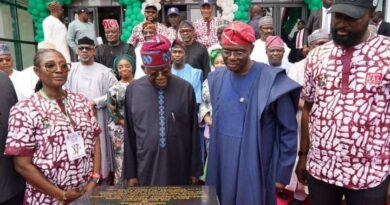There will be consequences if Tinubu uses his power to pass tax reform bill as Lagos state will be sole beneficiary—Governor Zulum
Professor Babagana Zulum, governor of Borno, has warned that while President Bola Tinubu can deploy his executive powers to pass the tax reform bills, there would be consequences for millions of Nigerians.
Zulum added that the proposed value-added tax (VAT) sharing model in the tax reform bills will only benefit Lagos and Rivers states.
Speaking on Channels Television’s ‘Politics Today’, the governor said insinuations that the northern region is against the Tinubu administration, due to its opposition to the tax bills, were wide of the mark.
He said the north overwhelmingly voted for Tinubu in the 2023 election.
“We know the powers of the president. I’m a system man, I respect him,” Zulum said.
“If the president wants to use his power to pass the tax bill, he may have his way, but it has its consequences for the people.”
BACKGROUND
In October, Tinubu asked the national assembly to consider and pass four tax reform bills.
The four bills are the Nigeria Tax Bill, the Nigeria Tax Administration Bill, the Nigeria Revenue Service Establishment Bill and the Joint Revenue Board Establishment Bill.
The Northern States Governors Forum (NSGF) opposed the bills, while the national economic council (NEC) asked Tinubu to withdraw them for further consultation.
In the Nigeria Tax Administration Bill, 2024, the legislation proposes a new VAT sharing model as follows: 10 percent for the federal government, 55 percent for states and 35 percent for LGAs.
Under this proposal, states will use the sharing ratio of 20:20:60 — equality, population, derivation.
In the current VAT sharing formula, the federal government takes 15 percent, states take 50 percent, while 35 percent goes to the LGAs.
States usually use the 50:30:20 sharing ratio — 50 percent for equality, 30 percent for population and 20 percent for derivation.
The proposed increase in VAT derivation from 20 percent to 60 percent has elicited criticisms, especially from northern stakeholders.
Section 77 of the Nigeria Tax Administration Bill, 2024 states that: “Notwithstanding any formula that may be prescribed by any other law, the net revenue accruing by virtue of the operation of chapter six of the Nigeria Tax Act shall be distributed as follows: (a) 10% to the Federal Government; (b) 55% to the State Governments and the Federal Capital Territory; and (c) 35% to the Local Governments. Provided that 60% of the amount standing to the credit of states and local governments shall be distributed among them on the basis of derivation.”
‘WHY THE RUSH?’
Zulum said northern stakeholders have done their research and discovered that the proposed VAT sharing formula will leave the region with the shorter end of the stick.
The Borno governor said the northern region, south-east and south-south geopolitical zones will be severely impacted by the legislation.
Advertisement
Zulum said the north is only demanding for more time to consult and understand the bills.
“On this tax issue, there are a lot of misconceptions. At NEC, we advised the federal government to pause for a moment in order to have deeper consultations with stakeholders,” he said.
Advertisement
“We felt that the VAT provision in the tax law, which clearly stated that VAT allocation should be based on derivation… the proposed bill further stated that 60 percent of the VAT tax will be shared based on derivation.
“I’m not an economist but based on the calculations that we did, only Lagos and Rivers states will benefit from this scheme. We did our own research and concluded that we would lose.
“The matter is that why are we in a rush? We advise the federal government to take a pause and remove some of the clauses in the tax bill that are inimical to the growth and development of not only northern Nigeria… south-east and south-south will be severely affected.
“We are in a democracy. We should understand the nitty-gritty of this tax regime. This is our bone of contention.”




